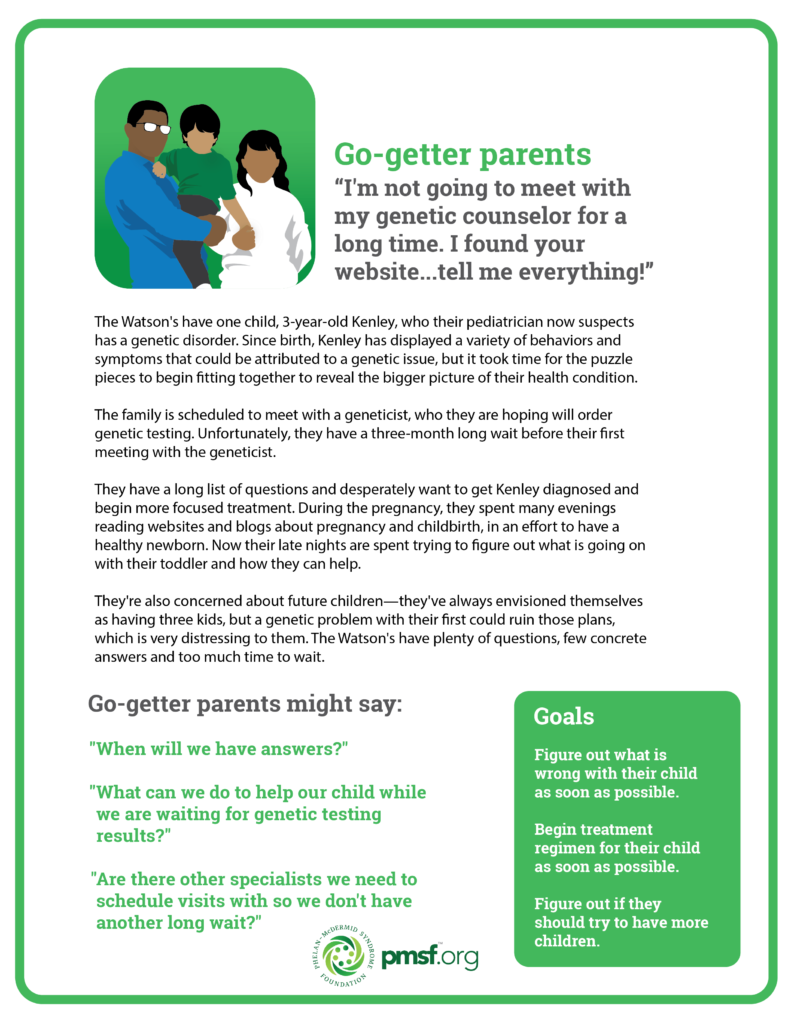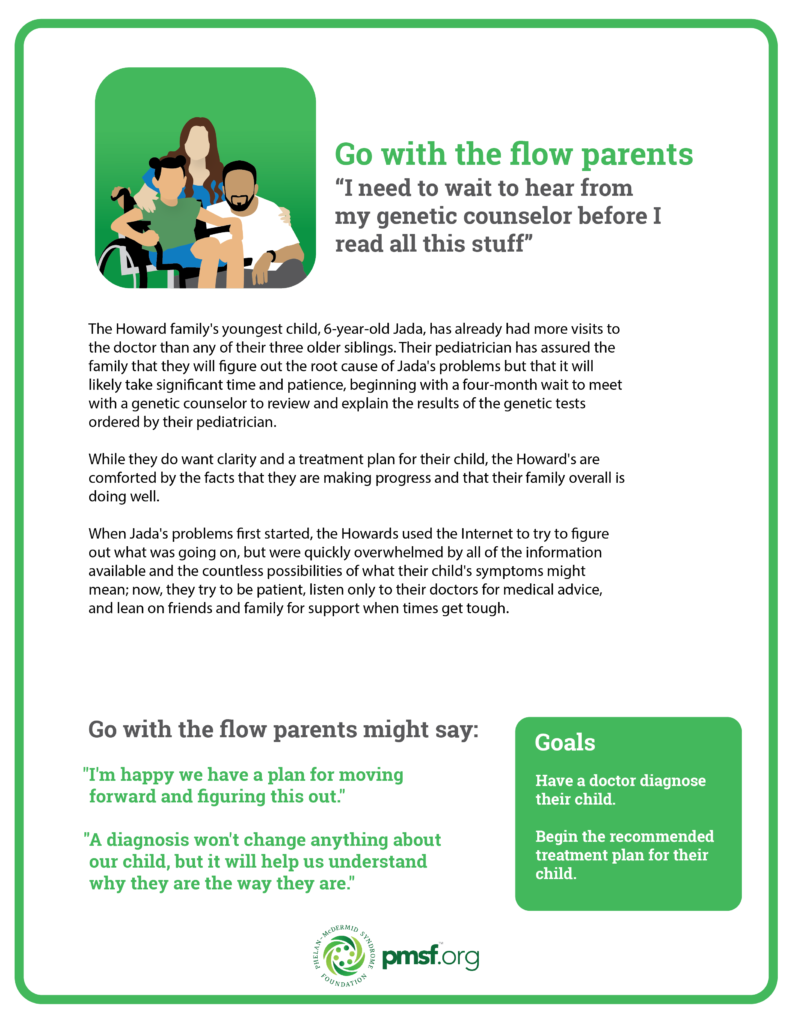Genetic Counseling
Genetic Counseling Experience
As a genetic counselor, you come across many patients with rare medical diagnoses. Phelan-McDermid syndrome (PMS) is extremely rare and relatively newly discovered, so many people, including genetic counselors, don’t know much about it or the particulars of living with it and raising a child who has it.
On this page you’ll find:
- resources for you, the genetic counselor, to learn more about PMS
- insights into what it’s like for the parents going through the diagnosis and raising a child with PMS
- tips on how to engage with parents
- resources to help you explain PMS to parents
tools to help you facilitate the next steps with parents - support resources for you to share with parents
Learn More About PMS
Genetic Testing Terms
About PMS: An overview of genetic testing terms
Follow-on Testing
Possible requirements for follow-on genetic testing
Research Roundup
Updates on new learning and research – “Research Roundup”
Research Opportunities
Clinical trials, natural history study, and PMS DataHub
The Parent Perspective

The Phelan-McDermid Syndrome Foundation worked with parents of children with PMS around the country to see how working with a genetic counselor could be a highlight on their journey of learning about their child’s diagnosis. Here’s what parents want from their genetic counselor. Here are some tips from the parents for engaging with them:
- approach the conversation with empathy – relate to them and their situation while being a strong support person for them:
- remind the parents, “The diagnosis does not define your child, they are still the child you love.”
- help make scary moments less scary by framing the information in a way they can absorb (small pieces of information at a time unless they’re ready for more) and by making sure they are in a safe place where they can focus on the conversation
- create some one- on- one time with the parents, they might have some questions that could be disturbing to their child
- have a two-way conversation with the parents – learn what they already know and build on to their knowledge
- level setting language:
- “I’m going to tell you things, you might know some of it, but I want to make sure we’re on the same page.”
- “Tell me what you know about PMS, I’ll clarify and add to it”
- embrace the fact that some parents will be googling everything they can about this, see what they’ve found, correct anything that needs to be corrected, and continue educating them about the PMS
- level setting language:
- be transparent about current PMS knowledge and the limitations within that – parents would rather hear that the answer to their question is currently unknown (remember this is still pretty new in the medical world) than speculation that the worst-case scenario might happen to their child — no doom and gloom
- The same deletion could have a very different impact on the lives of different patients. Even though predicting an individual patient’s outcomes is impossible, parents will want information unique to their child. Be transparent about what you know and what you don’t. Focus on short term next steps for them.
Family Personas
These personas represent archetypical families with children who have PMS. Each persona is based on a fictional family and is meant to help genetic counselors see what the parents and families are thinking, feeling, and doing. Know that some families will have attributes found in both personas.


- Do the other members of our family need to get tested?
- What about parent testing?
- What is the likelihood other kids we have in the future will also have PMS?
- What can I expect of my child specifically?
- What specialists will we need to work with in the future?
- What regular follow- ups should we have in the future?
- What other tests will we be going through?
- Do the other members of our family need to get tested?
- What about parent testing?
- What is the likelihood other kids we have in the future will also have PMS?
- What can I expect of my child specifically?
- What specialists will we need to work with in the future?
- What regular follow- ups should we have in the future?
- What other tests will we be going through?
Tools to Facilitate Next Steps
Parents want to see a path forward to know what is to come and help them plan for the future. However, because Phelan-McDermid syndrome is different for everyone, it’s not possible to show what a long-term path will look like. Instead, genetic counselors can focus on next steps that are universal to all parents. The tools in this section should be explored with parents/caregiver, not simply given to them.
Resources For Families/Caregivers
Parents and caregivers do not have to go through this experience alone. It is important, some say life-changing, to find a welcoming support group that is comprised of people who have similar lived experiences. Building a team of medical professionals and therapists can help develop treatment plans. It is also often beneficial to seek professional mental health support to help families cope with the grief and trauma that can come with the diagnostic experience.
You will find all of these link on the Quick Resource Page.
- PMSF Membership – the best way to get current information and to meet other families
- First 100 Days – a peer-support process for families of newly diagnosed individuals
- PMS Family Resources – to assist with setting up therapy, social services, education, legal and medical supports
- PMSF International Family Conference – a biennial international gathering of families, clinicians and researchers
- Mental Health Counselors: Suggest resources in your area (coming soon)
Basic Genetics 101
DNA
Learn More
Genetic Differences
Mutations
Inheriting Genes
Heredity
Additional Information
- How a Genetic Counselor can help you
- Glossary: Phelan-McDermid syndrome related medical terms
- Family Stories Video playlist of families of children with PMS
- Visuals



